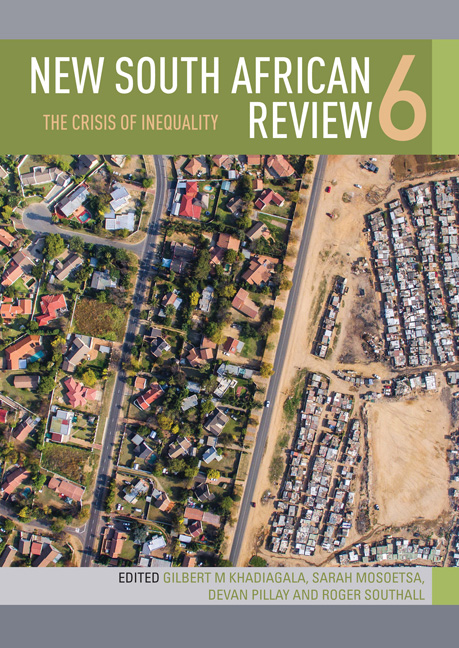Book contents
- Frontmatter
- Contents
- List of tables and figures
- INTRODUCTION: The global crisis of inequality and its South African manifestations
- PART 1 INEQUALITY AND CLASS: POLARITIES AND POLICIES
- PART 2 THE POLITICS OF INEQUALITY
- CHAPTER 5 Liberal democracy, inequality and the imperatives of alternative politics: Nigeria and South Africa
- CHAPTER 6 Liberalism and anti-liberalism in South Africa. Or, is an egalitarian liberalism possible?
- CHAPTER 7 Equality and inequality in South Africa: What do we actually want? And how do we get it?
- PART 3 SOCIAL DIMENSIONS OF INEQUALITY
- PART 4 LAND AND ENVIRONMENT
- Contributors
- Index
CHAPTER 6 - Liberalism and anti-liberalism in South Africa. Or, is an egalitarian liberalism possible?
from PART 2 - THE POLITICS OF INEQUALITY
Published online by Cambridge University Press: 23 March 2018
- Frontmatter
- Contents
- List of tables and figures
- INTRODUCTION: The global crisis of inequality and its South African manifestations
- PART 1 INEQUALITY AND CLASS: POLARITIES AND POLICIES
- PART 2 THE POLITICS OF INEQUALITY
- CHAPTER 5 Liberal democracy, inequality and the imperatives of alternative politics: Nigeria and South Africa
- CHAPTER 6 Liberalism and anti-liberalism in South Africa. Or, is an egalitarian liberalism possible?
- CHAPTER 7 Equality and inequality in South Africa: What do we actually want? And how do we get it?
- PART 3 SOCIAL DIMENSIONS OF INEQUALITY
- PART 4 LAND AND ENVIRONMENT
- Contributors
- Index
Summary
South Africa has a weak liberal tradition – but it has a strong anti-liberal one. Neither condition is especially difficult to explain in light of South African history. But the weakness of liberalism and strength of anti-liberalism both arguably carry costs. The weakness of liberalism has resulted in too shallow an embedding of liberalism's best insights within South African political culture; it has also forestalled the development of a radical, social or egalitarian liberal tradition which would counter inequality without sacrificing political and civil liberties. The absence of a radical liberalism has, in turn, deprived progressive politics of important intellectual and moral resources.
The weakness of South African liberalism should not be overstated. If liberal politics has remained marginal, liberal ideology scored significant victories in the 1990s. Actually, it scored two victories. One was the signing-up of South Africans to a Constitution that prescribes an essentially liberal-democratic polity; the other was the partial victory of classic free-market liberalism in economic policy making. These two victories need to be distinguished, at least from the vantage point of radical liberalism. The first victory marks the triumph of liberal-democratic precepts of political-system design, most of which have stood the test of the twentieth century and constitute the minimum requirements of any democratic system: direct, free, multiparty elections, universal adult franchise, constitutionally entrenched political freedoms, due process, separation of powers and political pluralism. The second is a victory of a classical liberal philosophy that regards private property and voluntary market exchange as fundamental anchors of individual liberty. One problem for egalitarian liberals is that in South Africa the first liberal victory is conflated with the second (as, arguably, it is by Samuel Oloruntoba in Chapter 5 of this volume). The conflation is unsurprising, given the tendency of both Western free-market ideologues and orthodox Marxists to treat capitalism and liberal democracy as inseparable. But it is, many social liberals would argue, a dangerous conflation, placing democracy itself in the firing line of anti-‘neoliberal’ critique.
The weakness of South African liberalism rests in the fact that it has found its core constituency in a demographically marginal layer: Anglophone middle-class whites, and a small minority, even, of that group. Liberalism alienated, and alienated itself from, more radical forces (both leftist and nationalist) that commanded much larger popular followings.
- Type
- Chapter
- Information
- New South African Review 6The Crisis of Inequality, pp. 115 - 134Publisher: Wits University PressPrint publication year: 2018



